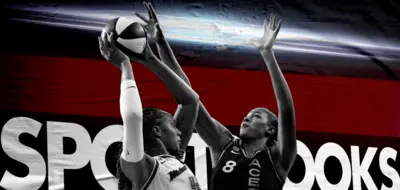
Risk is inherently unavoidable when gambling on sports. So much guesswork and chance, in addition to actual skill, is involved. Sure things almost don’t exist. For those who like to minimize, if eliminate their risk for single wagers at a time, there is matched betting.
Though a lot goes into this technique, matched betting is, in short, the process of working both sides of a wager while using a free, bonus, or promotional money you’ve received from your sportsbook. Investing in all potential outcomes ensures you’ll predict at least one correctly, and if you’re quite literally working with house cash, you’ll turn a profit in the end.
This is just one of many approaches that will pop up in beginner’s and expert’s betting guides. Is it the best strategy? One of the best strategies? We’ll let you decide.
-
EXCLUSIVE BONUS
 50% bonus up to $250No Code NeededPlay Now
50% bonus up to $250No Code NeededPlay NowT&C apply, 18+, Play responsibly
-
 100% bonus up to $1000No Code NeededPlay Now
100% bonus up to $1000No Code NeededPlay NowT&C apply, 18+, Play responsibly
-
EXCLUSIVE BONUS
 125% up to $2,500No Code NeededPlay Now
125% up to $2,500No Code NeededPlay NowT&C apply, 18+, Play responsibly
-
 $500 Sign-up BonusNo Code NeededPlay Now
$500 Sign-up BonusNo Code NeededPlay NowT&C apply, 18+, Play responsibly
-
 100% up to $1,000No Code NeededPlay Now
100% up to $1,000No Code NeededPlay NowT&C apply, 18+, Play responsibly
How Matched Betting Works
The best way to understand how to match betting works is to visualize it. We will get into the minutiae of this process soon enough, but right now, it’s time to layout a hypothetical situation.
Let’s say you’ve just joined a new sportsbook that offers a 100 percent deposit match on your first transaction. You take advantage of this promotion by putting $100 into your account, for a grand total of $200. Afterward, you then decide to peruse this week’s upcoming NFL betting odds and find yourself intrigued by the following point spread: New York Giants (+6.5) vs. Dallas Cowboys (-6.5).
Normally, you would pick one side of the coin, either the Giants or Cowboys and wait to see whether your decision pans out. With matched betting, though, you would play both point spreads. Yes, this means you’d throw money on the Giants at +6.5 and the Cowboys -6.5.
This no doubt sounds weird. But the logic winds up tracking. While your bet amount can vary, for the sake of this theoretical, let’s assume you use your entire bankroll, split evenly between New York and Dallas. That equates to $100 apiece.
Point spreads usually pay out -110, so your winning wager will net you a total payout of $190—your initial $100 bet, plus the $90 profit. Viewed in traditional terms, you will have just turned $200 into $190. But because you used $100 in promotional money to bankroll this wager, you’ve actually made $90.
Potential issues and hiccups abound here. Chief among them is that some sportsbooks won’t let you submit a bet slip that bets both point spreads in the same game. You can get around this by putting through separate tickets. At any rate, though, we’ve made a list of the best online sportsbooks at which you can consider trying your hand at match betting:
Matched Betting Tips
What wager types are best for matched betting?
The implementation of matched betting is most effective when you're dealing with two outcomes that have similar odds. You're trying to make sure you turn a small profit, and playing both sides of the fence at +250 and -250 opens the door for you to come out of a loser.
This is why point spreads and over/under are ideal for matched betting. Both sides of those wagers usually return -110, so you don't have to worry about one line severely underperforming relative to the other.
That necessitates vigilance when considering matched bets on moneylines. Consider the following game odds: Las Vegas Raiders (-300) vs. Los Angeles Rams (+350). Throwing $100 at each moneyline isn't in the spirit of matched betting.

Sure, the wager will pan out if the Rams win and you're turning a $200 total investment into a $450 payout ($350 profit on the moneyline plus your $100 bet). But you're plum out of luck if the game unfolds in the other direction. Your $100 bet on the Raiders would only net you a $33.34 profit if they win. Even if you're playing with partially free money, turning $200 into $133.34 is hardly a win.
Hunting around for more tightly contested moneylines should be the goal. They don't have to perfectly align as each other's opposites, as it is for point spreads and the over/under, but they need to at least be within the vicinity of one another. You don't really want to go above a -200 for a favorite and some will even drop that to -150.
These betting odds in general just need to be on the lower end. If an underdog is a +350, that's a pretty good indicator that the favorite will be something like -250 or even less lucrative. You should strive to juggle that sweet spot in which both sides of the bet are paying out -150 or slightly better. That's why matched-betting enthusiasts love to focus on point spreads and the over/under. Their payout structure is built almost specifically for this approach.
Something else to bear in mind: Matched betting is exclusively for wagers with only two possible outcomes. It should not be used for futures, in which you're wagering against fields that include entire divisions, conferences, or leagues. The same goes for certain prop bets that aren't yes-or-no questions and instead have you choose a specific player from a laundry list of them.
Should you use software for matched betting?
It can be difficult to effectively eyeball matched betting. You need to have a specific hold on how much you need to win on each two-best combination for it to be a worthwhile investment. You also need to keep track of all the possible scenarios, which can get dicey if you're not working with one game at a time.
Many people swear by matched betting software. You can always use a free online odds calculator to help you, but paid software does much more. It will identify games and lines best suited for matched betting; calculate a high volume of transactions in real-time; and, above all, inform you how much you need to risk on each to ensure your bet slip is as airtight as possible.
Very few casual sports gamblers are inclined to invest in what can be pricey or subscription-based software. That's fine. They can still dabble in matched betting by sticking to the over/under and point spreads. The software is more for the hardcore sports wagerers who want to place matched bets in volume and on moneylines.
Be Wary of Promotional Rollovers
Perhaps the biggest drawback to matched betting is the promotional rollovers sportsbook customers are subject to. These can be lengthy, and they take a lot of the air out of the thrill associated with this gambling approach.
Complicated still, rollovers are often listed in the fine print, so you have to really look for them in many instances. You also have to understand the concept of a rollover.
Let's assume you just set up a new account with a major online sportsbook. Their first-time deposit match bonus has awarded you an extra $100. That money isn't simply yours to withdraw. It will be subject to a rollover, which reflects how many times you must bet that bonus cash before it's actually yours to keep.

In this case, you're $100 in free money might be attached to a 10-time rollover. This means you need to bet that money 10 times—for a total of $1,000—before you can have it without strings attached. Theoretically, then, placing one matched might not do you any good. Some sportsbooks might have no rollovers on promotional money and free money, but most do—and some of them can be as high as a 25-time rollover.
Unfortunately, there aren't any loopholes for this issue. The closest you'll come is when a sportsbook doesn't differentiate between bonus money and your first deposit.
For example, let's say you have $200 in your account—$100 of your own money and a $100 promotion. If your sportsbook allows you to bet on both sides of the same point spread in the same ticket, the losing side may automatically be applied to the bonus money, in which case that's how you turn a profit. But if they separate your promotional funds from your own cash, you'll have to specifically choose where to allocate it, which will then allow your sportsbook to track its and hold you to their rollover terms.
This isn't the end of the world. It's an obstacle, but not a huge one. Each bet will at least count toward one of the rollover tallies, and this strategy does increase the likelihood you extend the shelf life of your bonus cash rather than losing it all in one shot.
The important thing to remember is that matched bets need to always be done with some promotional money. Using your own defeats the purposes of investing in both possible outcomes. You will always come out with a net loss unless you're gambling on starkly uneven lines and wind up hitting on the more lucrative one.









